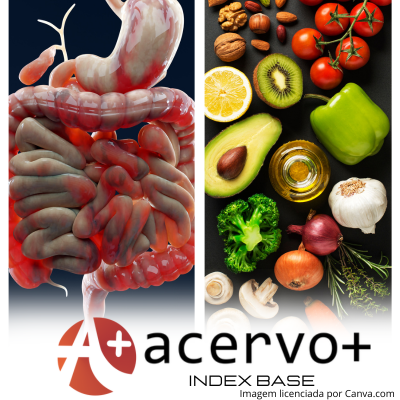A influência da alimentação nas fases de crise e remissão da doença de Crohn
##plugins.themes.bootstrap3.article.main##
Resumo
Objetivo: Analisar como diferentes padrões alimentares influenciam as fases de crise e remissão da doença de Crohn. Revisão bibliográfica: A Doença de Crohn (DC) é uma condição inflamatória crônica que afeta o trato gastrointestinal, caracterizando-se por fases de crise e remissão. Nesse sentido, a alimentação exerce papel essencial no manejo dessa doença, impactando diretamente a microbiota intestinal e a resposta inflamatória. Durante as crises, uma dieta equilibrada pode ajudar a mitigar sintomas e evitar o agravamento da inflamação, enquanto na fase de remissão, uma alimentação adequada pode favorecer um ambiente microbiano saudável, reduzindo o risco de recidiva. Considerações Finais: A alimentação é um componente fundamental na gestão da Doença de Crohn. Dietas específicas e bem balanceadas, adaptadas às necessidades de cada fase, não apenas aliviam sintomas durante as crises, mas também fortalecem o organismo para prolongar os períodos de remissão. A inclusão de fibras e alimentos anti-inflamatórios é uma estratégia promissora para estabilizar a microbiota intestinal e reduzir a inflamação, promovendo uma melhor qualidade de vida para os pacientes com DC.
##plugins.themes.bootstrap3.article.details##
Copyright © | Todos os direitos reservados.
A revista detém os direitos autorais exclusivos de publicação deste artigo nos termos da lei 9610/98.
Reprodução parcial
É livre o uso de partes do texto, figuras e questionário do artigo, sendo obrigatória a citação dos autores e revista.
Reprodução total
É expressamente proibida, devendo ser autorizada pela revista.
Referências
2. BAÊTA OM, et al. Doença de Crohn - uma revisão abrangente sobre a epidemiologia, fisiopatologia e patogênese, fatores de risco, diagnóstico clínico, diagnóstico imagiológico, manifestações extra intestinais, tratamento, nutrição e dieta. Brazilian Journal of Health Review, 2023; 6(4): 17438–17454.
3. BARBERIO B, et al. Prevalence of symptoms of anxiety and depression in patients with inflammatory bowel disease: a systematic review and meta-analysis. The Lancet Gastroenterology & Hepatology, 2021; 6(5): 359-370.
4. BASSON A, et al.Nutrition management in the adult patient with Crohn’s disease. South African J Clin Nutr, 2012; 25(4): 164–72.
5. CASTRO AM, et al.Parâmetros gerais da Doença de Crohn: fisiopatologia, fatores de desenvolvimento e incidência. JNT Facit Business and Technology Journal, 2023;1:3-18
6. COSTESCU S, et al. Does Magnesium Provide a Protective Effect in Crohn’s Disease Remission? A Systematic Review of the Literature. Nutrients, 2024; 16(1662).
7. DANIEL H, et al. The role of diet in the modulation of the gut microbiota. Nature Reviews Gastroenterology & Hepatology, 2019; 16(1): 1-15.
8. GEDIIB, et al. Grupo de Estudo da Doença Inflamatória Intestinal do Brasil. Atualização em Doenças Inflamatória Intestinais: Conectando a ciência à prática diária, 2019; p.172.
9. GHOSH S, et al. Dietary interventions in inflammatory bowel disease: A review. Journal of Gastroenterology and Hepatology, 2020; 35(5): 789-797.
10. GOUVEIA EC e ÁVILA LA. Aspectos emocionais associados a disfunções gastroenterológicas. Psicologia em Estudo, 2010; 15(2): 265-273.
11. GU P e FEAGINS LA. Diet in the pathogenesis and management of Crohn’s disease. Gastroenterology Clinics of North America, 2022; 51: 319-335.
12. GUTIERREZ A, et al. Dietary fibers and their role in the modulation of gut microbiota. Nutrients, 2020; 12(5): 1-15.
13. HENDY P e HART A. A Review of Crohn’s Disease. Eur Med J, 2013; 1: 116–23.
14. HENRY CJ, et al. Nutrition education and dietary interventions for patients with inflammatory bowel disease. Journal of Crohn's and Colitis, 2021; 15(1): 1-10.
15. INSFRAN LFL,et al. Contribuição genética para o entendimento da fisiopatologia da doença de Crohn / Genetic contribution to understanding the pathophysiology of Crohn’s disease. Brazilian Journal of Health Review, 2022; 5(2): 6265–6278
16. KAMMERMEIER J, et al. Management of Crohn’s disease. Arch Dis Child, 2015; 475–80.
17. MALIK A, et al. Gut microbiota and obesity: a review. Journal of Clinical Gastroenterology, 2018; 52(1): 1-10.
18. SANDERS ME, et al. Probiotics and prebiotics in intestinal health and disease: from biology to the clinic. Nature Reviews Gastroenterology & Hepatology, 2019; 16(1): 1-15.
19. SANTOS JE, et al. Manifestações clínicas e dermatológicas da doença de Crohn em pacientes imunossuprimidos, 2023.
20. SARLO RS, et al.Compreendendo a vivência do paciente portador da doença de Crohn. Acta Paul. Enferm., 2008; 21(4): 629-635.
21. SZCZUBEŁEK M, et al. Effectiveness of Crohn’s Disease Exclusion Diet for Induction of Remission in Crohn’s Disease Adult Patients. Nutrients, 2021; 13(4112).
22. VADLAPUDI SS, et al. Dietary interventions in Crohn’s disease: A simple solution to refractory disease. Indian Journal of Gastroenterology, 2024; 43(1): 18-21.
23. WĘDRYCHOWICZ A, et al. Advances in nutritional therapy in inflammatory bowel diseases: Review. World J Gastroenterol, 2016; 22(3): 1045–66.
24. YAMAMOTO FJK, et al. Diagnóstico y tratamiento de la enfermedad inflamatoria intestinal: Primer Consenso Latinoamericano de la Pan American Crohn’s and Colitis Organisation. Rev Gastroenterol México, 2016.
25. ZALTMAN C, et al. As Doenças Inflamatórias Intestinais na Atualidade Brasileira. Office Publicações Científicas Ltda, 2018.
26. ZHANG JL, et al. The effect of solid food diet therapies on the induction and maintenance of remission in Crohn’s disease: a systematic review. BMC Gastroenterology, 2024; 24(250).

